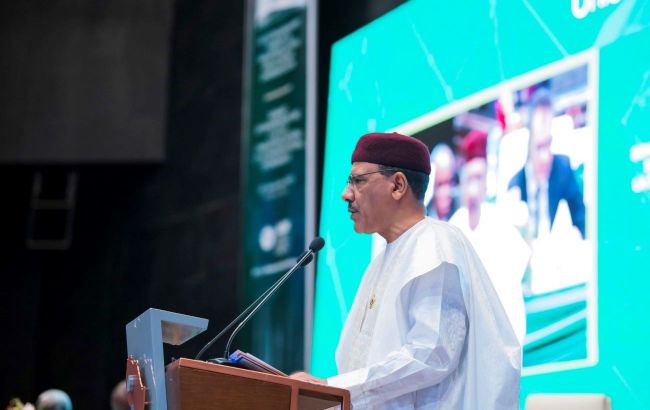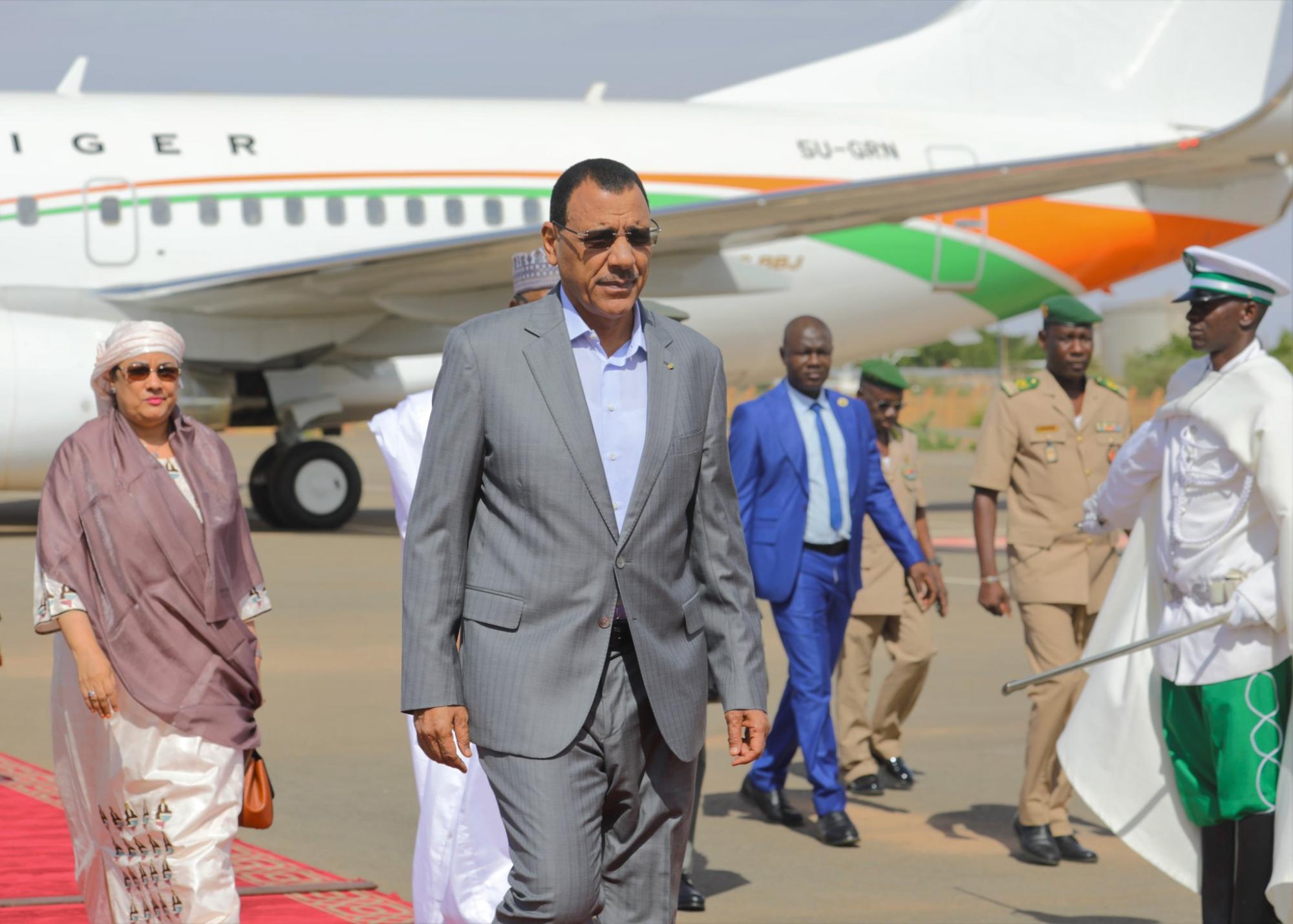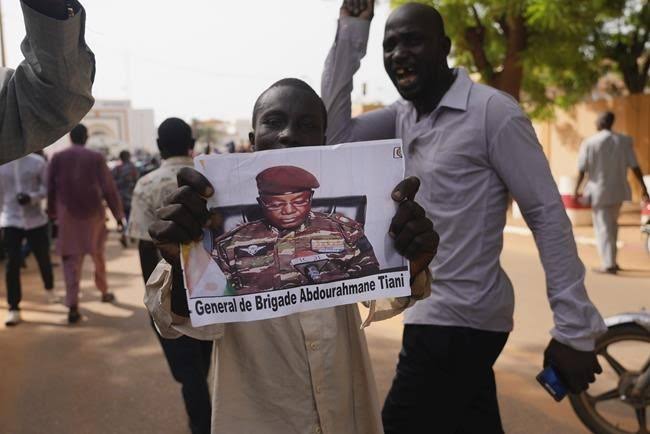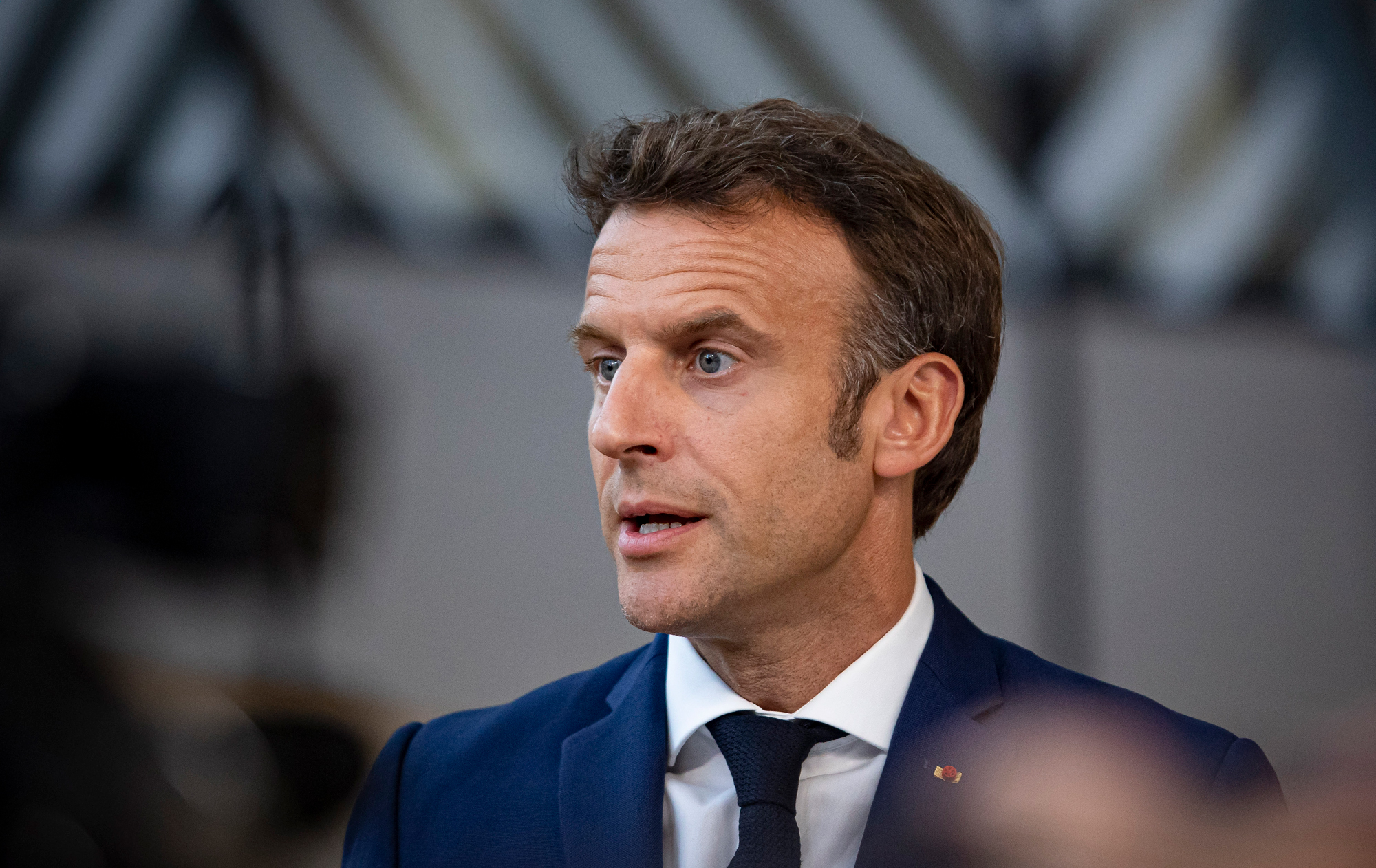New war? Coup in Niger, its effect on Africa, and Russia's involvement
 Niger's President Mohamed Bazoum overthrown and in custody (twitter.com/mohamedbazoum)
Niger's President Mohamed Bazoum overthrown and in custody (twitter.com/mohamedbazoum)
As a result of the coup in the West African nation of Niger, a military junta seized state power. Neighboring countries are threatening military intervention, while Western media speaks of possible Russian involvement.
RBC-Ukraine has collected everything about the coup in Niger and its potential effect on the region.
The coup in Niger and its potential impact on the region have captured global attention. Last week, the military overthrew democratically elected President Mohamed Bazoum and took power. To understand the context of these developments, below are some key facts about the country.
Niger is a landlocked country in West Africa, a former French colony, and one of the poorest nations, ranking 128th in the world economy with just over 26 million people. Over 80% of its territory is situated in the Sahara desert, with the rest occupied by the semi-arid Sahel region, which is constantly threatened by drought and potential famine.
The population is concentrated in the far south and west of the country, and its economy heavily relies on agriculture and the mining of natural resources.
Political instability
Since gaining independence from France, the young nation has suffered from chronic political instability. Niger has witnessed four coups since 1960, with the most recent one occurring in February 2010 when then-President Mamadou Tandja was ousted.

Photo: Mohamed Bazoum is considered the first democratically elected president of Niger (twitter.com/PresidenceNiger)
The first democratic transfer of power took place in 2021 when the current president, Mohamed Bazoum, assumed office after the voluntary resignation of his predecessor. Presently, representatives of the presidential guard are holding Bazoum under arrest.
Half of the population lives below the poverty line, partially due to the world's highest birth rate in Niger, where, on average, almost 7 children are born to each woman.
Like other countries in the Sahel region, Niger is losing large areas of arable land to desertification. Persistent droughts only exacerbate the threat of mass famine.
Fighting Islamist insurgents
Being neighbors with Mali and Burkina Faso, Niger continues to combat an insurgent movement associated with terrorist organizations such as "Al-Qaeda" and the "Islamic State." The unrest began in Mali in 2012 and spilled over into Niger, with attacks occurring as close as 100 km from Niamey, the capital of Niger.
One of the deadliest attacks occurred in March 2021 in the Department of Tahoua, where over 140 people were killed by Islamist militants. Currently, Niger is considered a stronghold for Western anti-terrorism operations in the region, with France maintaining a contingent of 1500 troops after withdrawing from Mali and Burkina Faso.
Uranium, gold, and oil
Niger is home to some of the world's largest uranium deposits. Almost 50 years ago, France, which relies on nuclear power for nearly all its electricity, initiated uranium mining in the northern region of the country.
Gold and oil are also extracted in Niger, but the vast majority of the population makes a living on agriculture.
Ancient cities of salt and clay
In the northeast, on rocky cliffs above the Sahara, lie ancient cities made of salt and clay. The origins of these so-called "ksars" in Djado, with their tooth-like walls, watchtowers, passages, and wells, still remain a mystery. Niger has applied for UNESCO World Heritage status for these sites.
The coup in Niger
Last week, on July 26, the presidential guard surrounded Mohamed Bazoum's residence and placed him under arrest. During the first day, reports of negotiations with the rebels surfaced.
However, within a few hours, it wa reported that the negotiations had failed. The presidential guard refused to release Bazoum, despite the fact that the Nigerian army did not support the coup and issued an ultimatum to the rebels.
On the morning of July 27, Colonel Amadou Abdramane made an announcement on national television, accompanied by several generals. Abdramane declared the overthrow of Bazoum, the closure of borders, and a curfew from 10:00 PM to 5:00 AM. He also warned neighboring countries against interfering in the country's internal affairs.

Photo: A supporter of the coup holds a portrait of Omar Tchiani, who has declared himself the president of the transitional period (twitter.com/AlSuraEnglish)
The following day, the head of the presidential guard, General Omar Tchiani, declared himself the president of the transitional period. Notably, in 2021, he was involved in suppressing an attempted coup, which aimed to prevent Bazoum from assuming leadership of the country. According to some reports, Tchiani learned that he was allegedly going to be dismissed, which prompted him to carry out the coup.
"All the hard-earned achievements will be preserved. All the Nigerien citizens who love democracy and freedom will ensure this," a post appeared on the legitimate president's Twitter account after Tchiani announced the seizure of power.
As of now, the junta has arrested at least four ministers and the head of the ruling party.
Reactions from the international community, sanctions, and invasion threats
The UN Security Council immediately held a meeting after the coup, during which a statement condemning the events in Niger was approved.
"Members of the UN Security Council expressed concern about the negative consequences of the unconstitutional change of power in the region, the rise of terrorist activity, and the difficult socio-economic situation," the unanimously adopted document stated.
The UN Security Council consists of 15 countries - China, France, Russia, the United Kingdom, and the United States (permanent members), as well as Albania, Brazil, Gabon, Ghana, Malta, Mozambique, the UAE, Switzerland, Ecuador, and Japan (elected for a two-year term).
UN Secretary-General Antonio Guterres called for the immediate release of Bazoum. The European Union condemned the coup, declared non-recognition of the junta, and suspended all cooperation, including EU funding.
Against the backdrop of the coup in the capital of Niger, an attack on the French embassy occurred. President Emmanuel Macron's office reported that Paris would not tolerate threats to its interests and any attacks on its diplomats, military, or businesses.
Today, on August 1, due to anti-French protests, Paris announced the preparation for the evacuation of French citizens from Niamey. The circulated message mentions that the evacuation by aircraft will take place as soon as possible.

Photo: French President Emmanuel Macron prepares to evacuate the French from the Nigerian capital and warns that Paris will not tolerate a threat to its interests (Getty Images)
U.S. Secretary of State Antony Blinken noted that further partnership with Niger depends on the preservation of democracy. The events in Africa did not escape the attention of Ukraine either.
"We emphasize the need to comply with Niger's national legislation and international law, rejecting any attempts at forced and illegitimate changes to the constitutional order," read the statement from the Ukrainian Ministry of Foreign Affairs.
The Economic Community of West African States (ECOWAS) initially issued a communique condemning the coup in Niger and then gave the rebels a week to restore power to Bazoum. Otherwise, member countries may conduct a military intervention.
During an emergency summit of ECOWAS, leaders of Benin, Côte d'Ivoire, Gambia, Ghana, Guinea-Bissau, Nigeria, Senegal, and Togo, as well as representatives from Cape Verde, Liberia, Sierra Leone, and the deposed president of Niger, took part in discussions.
West African countries imposed sanctions by closing borders, halting air travel, suspending financial operations, and freezing Niger's national assets. The displaced government has already stated that these measures threaten Niger with economic and social catastrophe.
In response, the rebels announced the suspension of uranium and gold exports to France. According to some reports, Niger produces between 15% and 17% of the uranium used in French nuclear power plants. The French energy company EDF (operator of nuclear power plants in France) stated that this would not affect their operations, as their energy sources are diversified, and nuclear power has coped during other crises, such as the COVID-19 pandemic and Russia's invasion of Ukraine.
Guinea, Mali, and Burkina Faso expressed support for the rebels and assured their readiness to fight on their side.
Russian involvement
President Mohamed Bazoum was considered a democratic and pro-Western politician, with a focus on partnership with the US and Europe. Under his leadership, Niger became not just a recipient of financial support but also a stronghold for the West in the fight against radical Islamists, as jihadist uprisings in neighboring Mali and Burkina Faso have led to coups.
Bazoum is also known for his pro-Ukrainian position: in 2022, Niger became one of the four African countries that supported the Crimean Platform. Additionally, under his leadership, Niger publicly supported the territorial integrity of Ukraine.
As a result, there is speculation in the media that the Russian Federation may be involved in the coup. There is no direct evidence, only some indirect signs that are being assessed.
Firstly, the coup in Niger occurred on the eve of the Russia-Africa summit, which was ignored by Mohamed Bazoum. Moscow is currently trying to gain support from Africa, and sway neutral countries to its side, including by providing free grain. It is possible that this is aimed at gathering allies for economic and military cooperation to continue the war against Ukraine.
The Wagner Group’s messaging in Niger:
— Zineb Riboua (@zriboua) July 30, 2023
The group is diffusing this video, below a translation of some of the messages it’s promoting (excuse low quality):
"For the third day in Niger, thousands of protests against the French occupation continue.
Today, all day long, a crowd of… pic.twitter.com/EhcWGWsVS1
Secondly, it is not ruled out that the military junta in Niger may be connected to the junta in Mali, which in turn has close cooperation with the Wagner private military company. Statements by the leader of the group, Yevgeny Prigozhin, contrast with the official Kremlin position, which condemns the coup.
"What happened in Niger is nothing more than the struggle of the Nigerien people against their colonizers, who are trying to impose their rules of life and conditions on them and keep them in the state in which Africa was hundreds of years ago," Prigozhin said, adding that thousands of Wagner militants can "restore order" without causing harm to the local population.
Thirdly, supporters of the coup last week protested outside the French embassy with Russian flags and chanted Vladimir Putin's name.
The British newspaper The Times believes that the coup in Niger has opened the doors for Putin to enter West Africa. The Western countries' categorical stance may lead to the African country losing millions of dollars in aid. Now Putin needs to carefully consider his response to avoid pushing the junta towards the proposed Wagner PMC decisions.
How the coup may impact Africa
As reported by the Associated Press, one of the main questions remains whether the junta will receive assistance from the Wagner PMC in its fight against Islamists.
Niger’s government had been "pretty open in terms of dialogue and engaging both domestically and with international partners," said Paul Melly, a consulting fellow with the Africa program at the Chatham House think tank in London. "So quite a lot is at stake here."
For many years, Niger has been a primary base for international operations against Boko Haram in Nigeria and Chad, as well as ISIS and the al-Qaida affiliate Jama’at Nusrat al-Islam wal-Muslimin in Mali and Burkina Faso.
Currently, the number of regional partners in the West is shrinking. The junta in Mali ordered a large UN mission to leave the country last month, allegedly due to failures in the fight against terrorism. However, accused Russian Wagner personnel involved in atrocities remain in Mali.
Since 2012, the United States alone has provided Niger with over $500 million in military aid, making it one of the largest support programs in African countries. This year, the EU launched a military training mission worth 27 million euros.
In the first six months of 2023, over 1800 attacks were recorded in West Africa, resulting in almost 4600 deaths. Most of these incidents occurred in Mali and Burkina Faso, but the UN fears that the coup in Niger adds instability to the region, and terrorists may spread their activities not only to Niger but also to Ghana and Côte d'Ivoire.
"We are witnessing that the whole belt south of the Sahara is becoming an extremely problematic area," said UN Secretary-General António Guterres recently.

